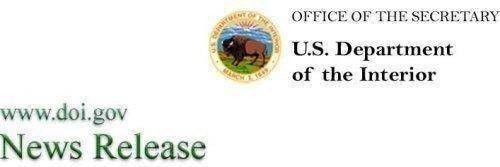Public Review Concludes Need to Modernize Federal Coal Program; Results Focus on Fair Return to Taxpayers, Transparency & Efficiency, and Program Impact on Climate Change
Press Release
WASHINGTON – The U.S. Department of the Interior’s Bureau of Land Management (BLM) today released the results of a comprehensive, public review of the Nation’s federal coal program. The review, based on hundreds of thousands of public comments and prompted by a Secretarial Order issued in 2016, examined concerns about the federal coal program that have been raised by the Government Accountability Office, the Interior Department’s Inspector General, Members of Congress and the public.
“Based on the thoughtful input we received through this extensive review, there is a need to modernize the federal coal program,” said U.S. Secretary of the Interior Sally Jewell. “We have a responsibility to ensure the public – including state governments – get a fair return from the sale of America’s coal, operate the program efficiently and in a way that meets the needs of our neighbors in coal communities, and minimize the impact coal production has on the planet that our children and grandchildren will inherit. The only responsible next step is to undertake further review and implement these commonsense measures.”
Secretary Jewell first called for an open and honest conversation of the federal coal program in March 2015. Today’s report outlines the need for modernization of the federal coal program in the following key areas: ensuring a fair return to Americans for the sale of their public coal resources, assessing the structure and efficiency of the coal program in light of current market conditions, and considering impacts on communities and the environment including climate change.
“Over the past eight years we have focused on modernizing and strengthening the way that energy is produced in America. As a result of that work, solar, wind and geothermal power are the fastest growing sources of energy in the United States and oil and gas are produced in safer and cleaner ways. It is vital that we update our nation’s coal program as well. This report provides the critical starting point for the modernization that is needed,” said BLM Director Neil Kornze.
The report sets out the best policy ideas available for addressing these important issues, and identifies the additional data and technical work needed to decide how to move forward.
Today’s report also identifies a number of good government modernization activities that will be taken in the near future to improve the program. These include increased transparency of the leasing program, increased protection for private surface owners and opportunities to prevent wasted natural gas from coal mines. Additional areas to be considered include: adjusting rental rates and bonus bids paid for leased coal to reflect inflation (which have not been updated in more than 30 years); strengthening financial and environmental responsibility requirements for operators who are permitted to bid on coal leases; and undertaking actions to improve lease process efficiency.
The production of federal coal accounts for more than 40 percent of all coal produced in the United States and is responsible for 10% of the country’s greenhouse gas emissions. While energy markets, communities, environmental conditions and national priorities have undergone major changes in recent decades, the BLM’s management of the federal coal program has stayed relatively static.
Next steps in the review process include finalizing the additional analysis identified in the report and completion of the programmatic environmental review required by Secretary Jewell’s January 2016 order.
Consistent with the practice during two programmatic reviews of the federal coal program that occurred during the 1970s and 1980s, the Interior Department has instituted a pause on issuing new coal leases while the review is underway. The pause does not apply to existing coal production activities. There have been limited, commonsense exceptions to the pause, including for metallurgical coal (typically used in steel production), small lease modifications and emergency leasing, including where there has been a demonstrated safety need or insufficient reserves.
Companies can continue to mine the large amount of coal reserves already under lease, estimated to be enough to sustain current levels of production from federal land for approximately 20 years.
The report issued today is available here. Comments received during the scoping process, which included public meetings in Casper, Wyo.; Salt Lake City, Utah; Knoxville, Tenn.; Grand Junction, Colo.; Seattle, Wash.; and Pittsburgh, Pa., were posted online in August 2016 and are available here. Transcripts of these are available here. Additional information about the BLM’s comprehensive review of the federal coal program can be found here.

